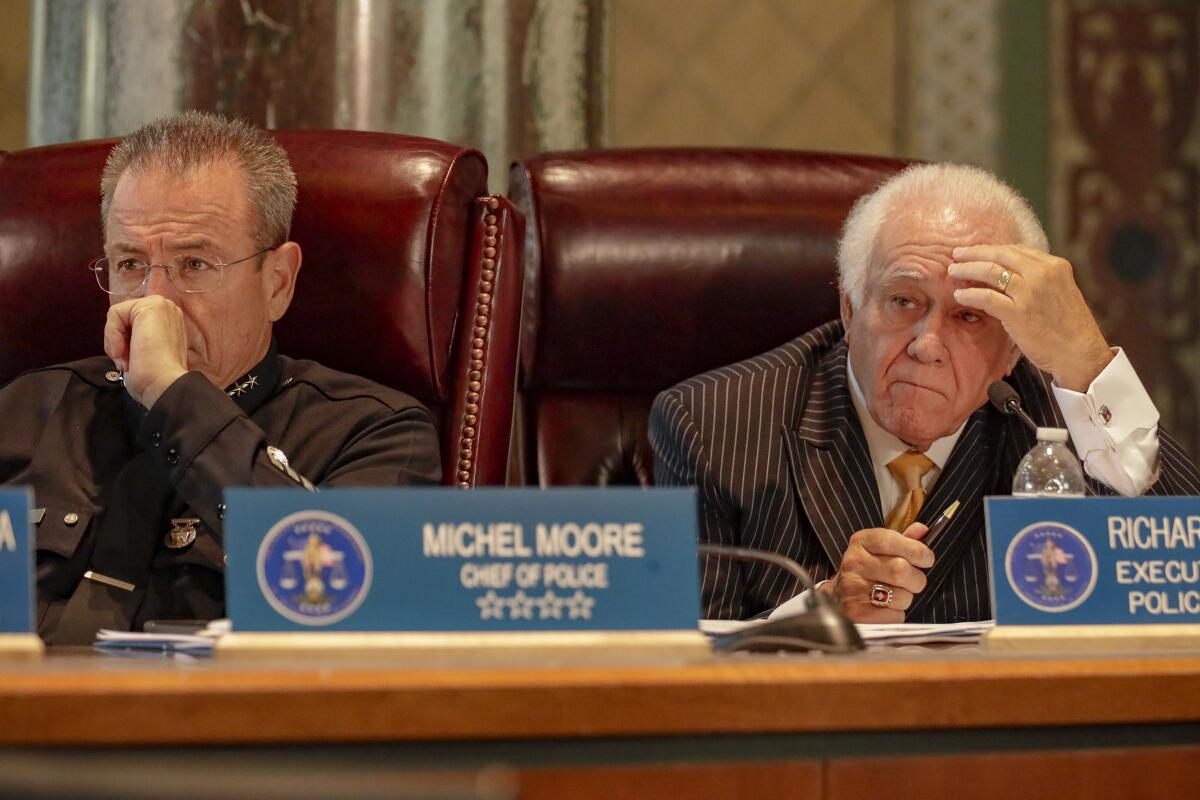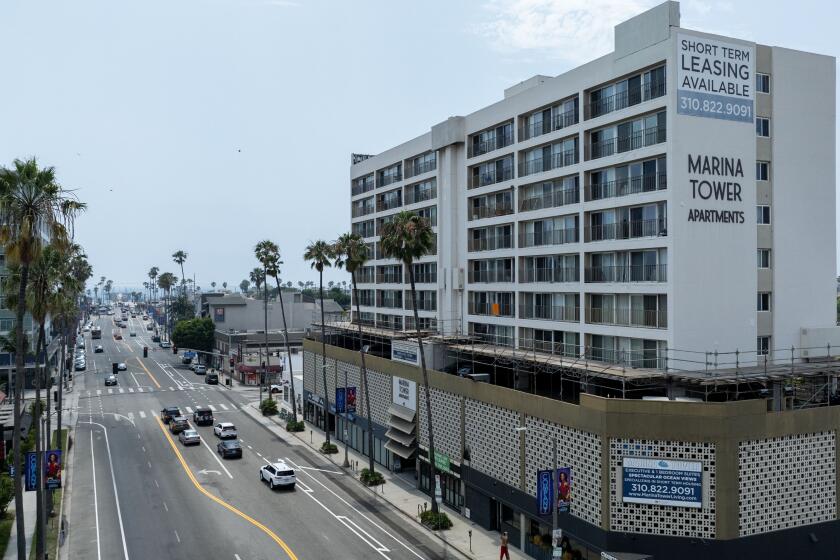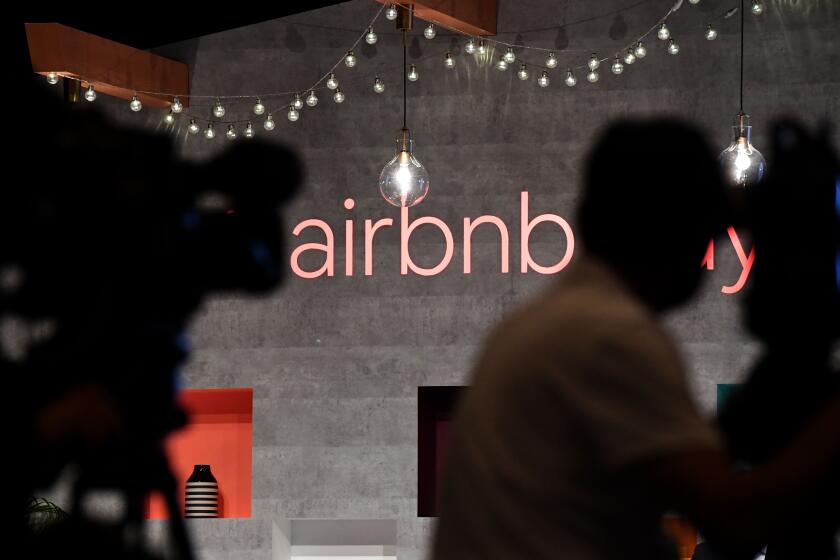L.A. police officials say they cannot enforce new measure targeting Airbnb party houses

- Share via
Months after warning the Los Angeles City Council that they were not prepared to handle new permitting regulations for short-term rentals, including Airbnbs, police officials say they still need more time before they can start enforcing a law that took effect July 1.
In a July 11 letter to the council, the Police Commission’s interim executive director, Django Sibley, said the body has “neither the infrastructure nor the staffing that would be required to implement” the so-called Responsible Hotel Ordinance, or RHO.
The new law includes a police permit requirement for short-term rental and hotel operators that proponents say will help the city crack down on party houses. But, although the commission launched a website where operators can apply for permits, it is not taking action against those who do not comply.
Vladyslav Yurov and his partners are the focus of a new lawsuit by the L.A. city attorney, who alleges that they made more than $4 million through illegal short-term rentals on units they had leased.
Commission officials have been asking the City Council for months to direct the city’s chief administrative officer to “establish an office dedicated to the administration and enforcement” of the ordinance, or delay its enactment by a year.
Citing the “infeasibility of full implementation,” Sibley’s July 11 letter said the commission “cannot and will not issue permits, enforce the police permit requirement, or investigate complaints related to compliance with the RHO.”
The ordinance was the result of a last-minute deal struck between the council and the politically powerful hotel workers’ union to avert a controversial ballot measure that would have required hotels to house homeless residents in vacant rooms to help ease the city’s housing shortage.
Instead, the council passed the RHO, which requires hosts of short-term rentals — including Airbnbs and Vrbo properties — to obtain a police permit in order to operate, like dozens of other businesses. An earlier report by the LAPD suggested initial fees of $260 for short-term rental operators. The City Council and neighborhood residents will be allowed to challenge the issuance of the permits.
L.A. is about to get a new police chief. Here is an inside look into how this crucial position is being filled.
The commission is a five-member civilian oversight body that functions much like a board of directors for the LAPD. Its investigative arm is already responsible for the “processing, investigation, issuance, and enforcement” of more than 60 types of permits issued by the LAPD, including those for cafes with live entertainment, bowling alleys, consignment stores and towing companies. Many permits require criminal background checks and can cost hundreds of dollars in fees.
The RHO passed unanimously last November despite opposition from industry groups such as the Hotel Assn. of Los Angeles, which argued it creates an unfair regulatory burden for smaller, mom-and-pop operators.
Others questioned whether it would increase the LAPD’s workload.
Commission officials said they anticipated that more than 10,000 hotels and short-term rentals across the city would be required to comply. They said the commission would need to develop a new online portal to handle public complaints about problem properties and staff up the unit responsible for enforcement to at least 25 employees, at an annual cost of $2.85 million.
In a statement on Monday, Councilmember John Lee acknowledged the commission’s repeated arguments “that they lacked the staffing and resources to implement this ordinance.”
“The city routinely asks our departments to do more than their capacity allows so it is no surprise that there is no robust system to enforce this ordinance after the effective date and after the Council failed to provide the commission with the necessary resources,” said Lee, who voted in favor of the ordinance. “While not a perfect outcome, the Council’s vote prevented the advancement of a ballot measure that would have decimated the economy of the City of Los Angeles.”
At a commission meeting earlier this year, several members bristled at being ordered by the council to take on the responsibility without additional support.
Commission Vice President Rasha Gerges Shields said she found the council’s decision incongruous with a broader push “to reduce the footprint of the LAPD by identifying current activities that could be done with unarmed response.”
The ordinance, five years in the making, would prohibit hosts to list second homes, accessory dwelling units or investment properties in unincorporated L.A. County.
“Instead this is essentially creating an entirely new regulatory scheme” that relies on police, she said.
The new duties “will essentially turn the commission into the ‘Hotel and Airbnb Commission,’” she said.
Randy Renick, executive director of Better Neighbors L.A., a coalition that includes hotel employees, renters’ rights groups and housing advocates, sees the finger-pointing around the ordinance as another sign of the city’s unwillingness to address issues with short-term rentals. He pointed to several recent shootings at off-the-books rental properties that he said underscored the need for police involvement.
“I think short-term rentals, the crime around them and the contribution to the housing crisis, needs to be addressed on multiple fronts and there are multiple city agencies that need to address it, including the police,” he said. “City Council gave this responsibility to police; they need to do it.”
Times staff writer David Zahniser contributed to this report.
More to Read
Sign up for Essential California
The most important California stories and recommendations in your inbox every morning.
You may occasionally receive promotional content from the Los Angeles Times.














